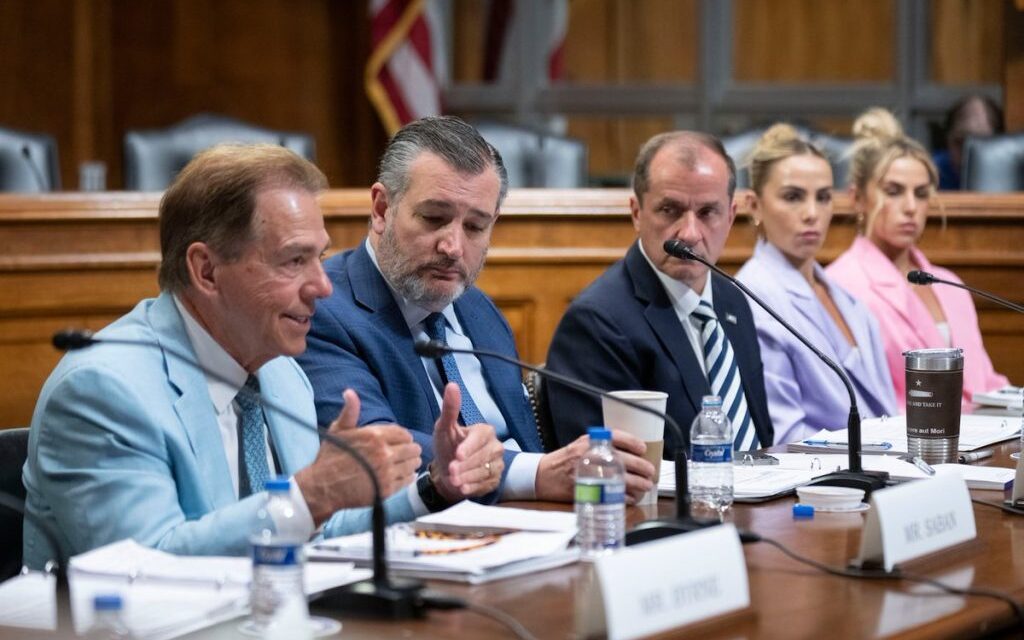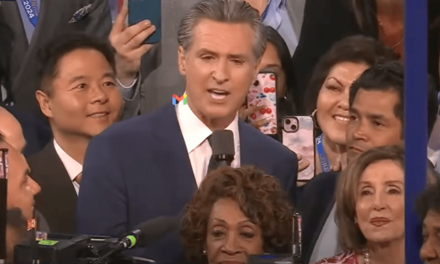This is an opinion column.
You know it’s serious when Nick Saban volunteers to sit next to Sen. Ted Cruz on national television.
Can’t wait for the ESPN College GameDay posters celebrating that iconic moment in American history.
Saban went to Washington this week to lobby Congress about college football. He’s a big name and that always helps inside the Beltway. Cruz organized a roundtable discussion on behalf of the college football power brokers who have been petitioning Congress to write laws in their favor. Saban and his friends want to “save” college football from destroying itself, or at least that’s what the people who stand to lose the most money amid the sport’s current reckoning want everyone to believe.
Is college football broken, though? I wonder what Ohio State thinks about the current state of things.
Before we take this crusade up in Washington seriously, maybe we should listen to what some current college football players have to say about the sport they play. Something tells me that running back Quinshon Judkins and safety Caleb Downs might have different perspectives.
I’d love to hear their testimonies about this last year.
Judkins, a former Montgomery-area standout, began his college career at Ole Miss playing for Lane Kiffin. Downs was at Alabama last season with Saban. Both are now enrolled at Ohio State and will be playing for a loaded Buckeyes team this fall.
Oh, and Ohio State’s boosters paid those players a lot of money to do it, of course. Judkins and Downs can play immediately next season thanks to rules written by the NCAA.
College football has never been better for the Big Ten.
Schools like Alabama, Auburn and Ole Miss hate this new reality of college football. I can’t blame them. I don’t like it either. The schools in the Big Ten apparently have deeper pockets and are paying for all the best players. Does that mean Congress should write laws to prevent it from happening? I’m not too sure about that.
The last time I checked, this country takes free-market capitalism pretty seriously.
Coaches are always saying that the players these days act entitled. I’d prefer to think that the players are finally beginning to make money and understand what they’re actually worth. Saban made over $11 million last season. His salary kept going up and up through the years because that’s what the free-market system dictated. Shouldn’t the players have those same opportunities to maximize their brief financial window of opportunity?
No one knows the future of college football, but I know for a fact that the old days are gone and they’re not coming back. Saban knew it, too.
He told members of Congress that he retired in part because his players wanted to know how much money they were getting paid and how much playing time they were going to receive. That didn’t sit right with me. Let’s be honest. Saban’s powerful grip on college football was slipping and he could feel it. He’s now joining ESPN College GameDay for millions and could end up making more money than when he was a coach.
I give Saban a lot of credit for trying to help, but who is he really trying to help? He seems to genuinely care about the future of the sport that made him rich and powerful. I’m not putting any faith in the federal government “fixing” college football, though. There are no easy answers when it comes to reform because the system is inherently corrupt. The Supreme Court ruled unanimously in 2021 that college sports are not exempt from antitrust laws.
When does the Supreme Court ever rule unanimously on anything?
Saban told the politicians that the players are only in it for the money and not the right reasons. That made me laugh. That’s the name of the game in Washington.
Like Saban, Auburn coach Hugh Freeze is using similar language about the evolution of modern-day college football players. Freeze calls it the “disease of me.” I give players more credit than that. People can enjoy being part of a team while still getting paid for their work. That’s every company in the country, or at least the good ones. This is the system that college football created and players are just adapting to the times. Maybe Freeze needs to adapt his coaching, too. I’m sure he will… or he won’t be there for long.
Here’s the dirty truth about college football. The economics that created the sport’s problems should have been illegal, and the coalition that has been lobbying in Washington represents a specific interest group and not all of college sports. It’s cronyism. Saban, Freeze and Kiffin have inflated salaries because the athletes playing the sport were never paid. Those coaches all have the same sports agent, and Jimmy Sexton has benefited more than anyone from college football’s sham-ateurism.
Greed, and not the altruistic idea of saving college football, is the motivating factor behind everything. I’m not sure college football needs “saving,” but I appreciate Cruz’s attempt at gaslighting the public. If players start getting their fair shake, then that probably means all these bloated coaching salaries come down, right?
Maybe sports-agent Sexton can just start representing more players.
These are confusing times in college football. Conferences are shifting, and probably will continue to do so. The realignment of the leagues chasing TV dollars is the sport’s real problem. The TV networks have all the power because they’re funding everything. I didn’t see anyone from the SEC lobbying Congress when the Pac-12 was being chopped up by ESPN and Fox.
The College Football Playoff just expanded to 12 teams, but now wants to jump immediately into 14. Expansion can be a good thing for parity, but the fix is in. The SEC and Big Ten want three automatic bids each while the entire Group of 5 will share just one. If college football’s mob bosses don’t get their way, then they’re going to break everyone’s kneecaps. Someone needs to tell Don Corleone and Al Capone to pipe down.
Saban says parity is going away in college football, but the sport was never fair. Alabama’s old coach is just an employee of ESPN at this point, and so he’ll represent that company’s interests like everyone else at the World Wide Leader. If college football wanted to create more parity across the board, then it would expand the playoffs to 21 or 24 teams and give everyone an automatic bid. Simple as that.
In one breath, the SEC and business partner ESPN want antitrust legislation passed by the end of the year to regain power over the players. In the next breath, they want to collude with the Big Ten and Fox and limit the earning potential of Group of 5 schools … and it has to happen by the end of next week or else.
Their scam is an old hustle, but it looks like they have a new face to pull it off.
SOUND OFF
Got a question about the changing landscape of college football, spring practice in the SEC or college hoops? Want to get something off your chest? Send Joe a question about what’s on your mind for the weekly mailbag. Let your voice be heard. Ask him anything.











